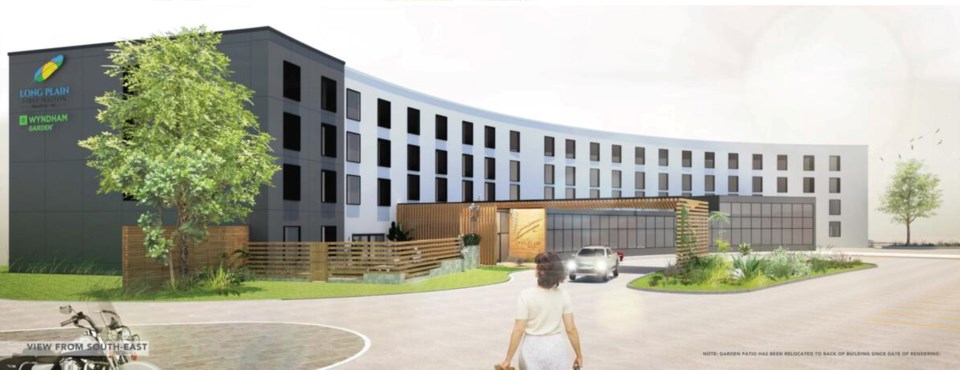Throughout PCL’s history, the company has worked on Indigenous projects and with Indigenous partners. These projects have been collaborative endeavors that prioritize Indigenous employment, training and capacity-building for community businesses.
Over the last few years, PCL has refocused on opportunities in Manitoba and Northern Ontario.
Josh Girman, Manager, Indigenous Relations, leads these partnerships for all of PCL’s Canadian offices while working out of PCL’s Winnipeg office. One recent example, located on one of Winnipeg’s first urban reserves, is the Ado Aki Wyndham Garden Hotel and Conference Centre.
“Urban reserves are emerging and unique. Projects like the Ado Aki create economic opportunities for community owners,” says Girman, adding that PCL has been supporting urban reserve projects for many years.
The project began with several potential outcomes. PCL worked with Long Plain First Nation and its development group, Arrowhead Development Corporation, for about five years on different iterations of the project. It began as an office complex, then evolved into a hotel complex as the client’s business needs and considerations grew. PCL supported development and preconstruction activities and provided budgeting expertise while the group sought funding. Before construction began, the project went through a series of design iterations.
“It has been a collaborative process with the client, Arrowhead Development Corporation,” says Girman. “It has also been an exciting opportunity for PCL to do some ground-breaking work by constructing the first major hotel in Winnipeg built on an urban reserve.” And it won’t be the last.
There are many projects and urban reserve developments coming down the road, not only in Winnipeg, but in other urban centres. “It’s a huge opportunity—not just for Indigenous communities, but for the whole country and the economy, especially where urban reserves are emerging,” says Girman.
Business Opportunities & Support for Indigenous Owned Companies
PCL’s aim is to ensure all stakeholders are included at every step of the project and are involved in the decision-making process. For the Ado Aki project, this included the development corporation owned by the First Nation as well as the chief and council of the community.
"Each First Nation community has their own culture and process related to decision making and community involvement,” says Girman. “It’s critical to listen and understand how the community operates so that we can make sure our approach aligns with their needs.”
Employment & Training Opportunities for Indigenous People
In the early days of the pandemic, PCL worked quickly to successfully convert shipping containers into visitation pods. These structures allowed families to safely visit their loved ones in long-term care facilities during this difficult time.
Indigenous Services Canada called upon the company to create visitation pods within the personal care homes in six First Nations communities across Manitoba. PCL hired the communities’ construction companies whenever possible. They also followed community protocols and made sure everything they did was in lockstep with the protections required.
“These are remote communities that were struggling with Covid-19, so we took many extra measures to make sure our crews were isolated from the community as we completed the work,” says Girman. “We needed to make sure that the communities remained safe,” he adds, noting that some of them were only accessible by air or winter road.
Community Partnerships
PCL has been developing a partnership with the Matawa First Nations for many years and in March 2020, a memorandum of understanding was signed by PCL, Matawa, EPCOR, OPG and Enterprise Canada to create a consortium that will give Matawa the resources and the capacity they need to direct the development and delivery of their own infrastructure.
“The idea is to work with communities on Indigenous-led solutions that can allow these same communities to really take control of the process. Providing expertise and resources that allow them to take that control is critical,” says Girman.
“We’re excited about the opportunity to support Matawa and their infrastructure needs and to support Indigenous-led solutions to infrastructure within these communities. Many of these communities have significant infrastructure deficits and different bodies, including the federal government, have been trying to solve these problems for a long time. We are looking to support Indigenous-led solutions.”
As a company, PCL prioritizes relationship development to support much-needed infrastructure upgrades and additions. When a project starts, the first priority is to get it built safely on time and on budget, but they’re always looking ahead: what’s the next project that is needed? How can they set the community up for success? How can they help build capacity?
The aim is to help communities take control of their future and their infrastructure, and to have the capacity they need to meet their current and future goals.
Says Girman, “That’s where we’re focused—looking at projects from that lens of capacity-building and trying to find ways to utilize a project as a launchpad for the community’s development. Helping communities develop their own infrastructure is the ultimate goal.”
Learn more about PCL Construction or call Paul Franklin, Area Manager at 705-995-2225.

